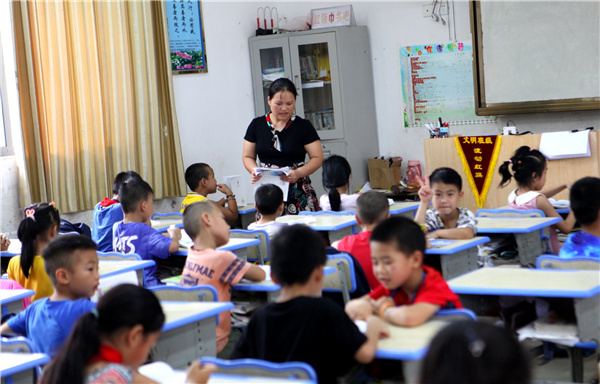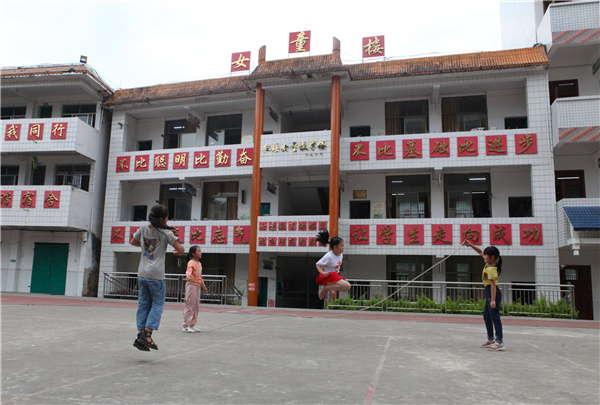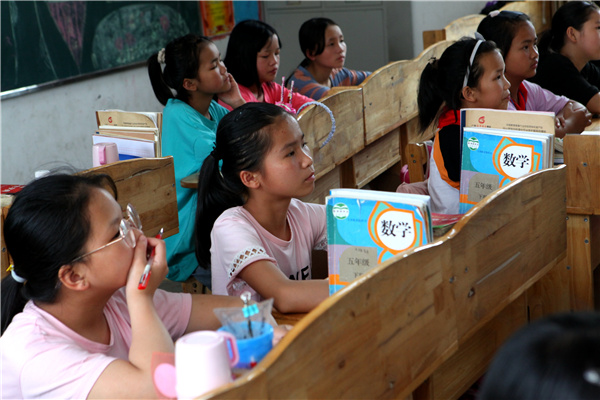Spring Bud Project bears fruit on Damiao Mountain

Dai Yingmei gives a lesson at Central Primary School of Baiyun. (CCTF)
"My dear students, the Party and the government have attached great importance to education and poverty reduction in ethnic minority areas, and they have made huge investments in improving our access to drinking water, electricity and transportation. Now, the dreams of older generations to live in spacious apartments, with lamps and telephones, and to drive their own vehicles, have come true. Thus, you should study hard to become contributing members of society," Dai Yingmei, a rural primary school teacher from South China's Guangxi Zhuang autonomous region, told her students, on September 14, during a class on morality and the law.
Dai, 42, teaches at Central Primary School of Baiyun, a township in Rongshui Miao autonomous county. The county is commonly referred to as Damiao Mountain by the locals.

Several students skip rope at Central Primary School of Baiyun. (CCTF)
Dai was born into a rural, ethnic Hong Yao family, in a remote village in Baiyun, in 1980. Hong Yao is a branch of the Yao ethnic group.
Dai had to stay at home and help her parents look after her younger siblings and graze the pigs and cattle, even after she had reached school age. In those days, Hong Yao people opposed the idea of sending girls to school.
"I was very envious of boys, who could go to school at my age, as I was left shedding tears alone," Dai recalled.
Her dream to study at school was reignited in 1988 after cadres of Rongshui Women's Federation, in collaboration with the local departments of ethnic affairs and education, visited ethnic Yao villages to encourage parents to allow their daughters to receive an education.
Thanks to the patience of the cadres, especially in explaining why girls should attend school, Dai's father finally agreed to let her enroll.
Dai said it was an "historic, epoch-making development" when ethnic Yao girls were allowed to attend school. She remembers how she was too excited to sleep the night before she returned to school.
With 44 other ethnic Hong Yao girls, Dai in 1988 enrolled in the first class exclusively for them in Central Primary School of Baiyun. The girls received care and support from individuals and organizations, many of their school fees were waived, and they received subsidies for their meals.
All of the students studied hard, and they led frugal lives on campus. Three of the students eventually became teachers, and one became a doctor. Two other students are now employees in public institutions.
The success of the class opened a new path for dropout girls in poverty-stricken ethnic minority areas of China to get an education. In particular, that class was the prelude to the Spring Bud Project.
With support from people from all walks of life across China, Dai completed her nine-year compulsory education, and then she graduated from Rongshui Teachers' School.
During the past two decades, Dai has worked at several grassroots schools in Baiyun, and she has put her heart and soul into imparting knowledge and love to her students. She has never complained about the harsh conditions at the schools.
Dai returned to Central Primary School of Baiyun, to teach, in 2011. She often says she was very lucky to attend the first class for ethnic Hong Yao girls, and she says she is proud to be a teacher at her alma mater, and to be conveying love to children in the mountains.

Students attend a math class at Central Primary School of Baiyun. (CCTF)
Given improvements in national education policies, girls of all ethnic groups are now entitled to study in the girls' class that was formerly just for ethnic Hong Yao girls.
Meanwhile, the primary school has made substantial improvements in both its teaching facilities and the quality of its teachers.
During the past 30 years, more than 500 Hong Yao girls have attended schools in Rongshui, and more than 30 of them have gone on to attend university. Many of those students have become teachers, military officers, civil servants or entrepreneurs, and all have written splendid chapters in their careers.
Implementation of the Spring Bud Project in Guangxi has helped many schoolgirls from impoverished families regain their opportunity to attend school. Now, beneficiaries of the project, with grateful hearts, are advancing the Spring Bud Spirit, giving back to society and helping people in need.


